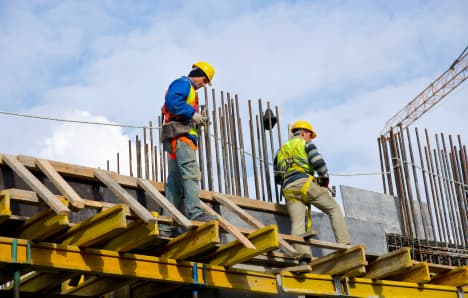WORKERS’ COMPENSATION IN HAWAII: WHO NEEDS COVERAGE AND WHY

Get rates from the top insurance providers in America with an instant quote from us.






OVERVIEW OF WORKERS’ COMPENSATION IN HAWAII
Hawaii’s workers’ compensation has an influence on most full-time and part-time employees who get hurt or sick because of their job. The system aims to give medical care and replace wages for workers injured at work helping them as they get better. However, some groups of workers might not qualify because their job type how they’re paid, or legal status puts them outside the rules. This makes it crucial for bosses and workers to know who can get coverage and who can’t, to stay out of trouble with the law and make sure hurt workers get the help they should.
Who Qualifies for Workers’ Compensation in Hawaii?
Full-Time & Part-Time Employees
Almost all regular employees qualify, regardless of the number of hours worked.
Seasonal & Temporary Workers
Eligible if they meet established employer-employee relationship criteria.
Minors & Apprentices
Receive benefits regardless of their age or current training status.
Employers must offer coverage from the employee’s first day at work.
Get a Free Workers’ Compensation Insurance Quote
In only 5 minutes of your valuable time. We can often get same day coverage.
Get a Free Workers’ Compensation Insurance Quote
Who Is Not Covered?
Independent Contractors
Considered non-employees unless misclassified. Employers may face penalties for improper classification.
Sole Proprietors & Partners
Not required to carry workers’ compensation, but may voluntarily opt in for added protection.
Agricultural & Domestic Workers
Coverage depends on the number of hours worked and total earnings. Some may be exempt by law.
Volunteers & Nonprofit Workers
May not be covered unless a policy explicitly includes them.
Do you have a question?
Call us 24/7.
- Get your certificate of insurance.
- Update your coverage.
- Edit billing information.
- Change business address.
- Customer service.

Filing a Workers’ Compensation Claim in Hawaii
Contact Info for Workers’ Comp in Hawaii
To get help with workers’ comp claims, disagreements, or employer rules, you can contact the Hawaii Department of Labor and Industrial Relations (DLIR) Disability Compensation Division (DCD). They have offices throughout the state. Whether you’re injured at work, run a business, or handle insurance, these offices can guide you on how to file a claim, report a work injury, or dispute a benefit denial.
(808) 586-9161
(808) 974-6464
(808) 243-5322
(808) 274-3351
Each office helps process claims, enforce compliance, and answer questions. You can call or visit your nearest DCD office for help with an existing case or to file a new claim. To learn more, visit the DLIR website or speak to a claims representative.
Medical Benefits Under Hawaii Workers’ Compensation
Hawaii’s workers’ compensation system ensures that injured employees get medical care at no cost. This includes doctor visits, hospital stays, prescriptions, physical therapy, and diagnostic testsWC-Highlights.
Covered Medical Services
When a workers’ compensation claim gets the green light, the insurance company has to pay for all reasonable medical costs, such as:
- Appointments with doctors and specialists
- Hospital stays and emergency treatment
- Drugs prescribed by a doctor
- X-rays, MRIs, and other medical scans
- Physical therapy and rehab sessions
- Fair travel expenses linked to treatment
Hawaii’s Unique Workers’ Compensation Laws: How They Differ from Other States
Hawaii’s workers’ compensation system influences several unique policies and rules compared to other states. These differences impact employee coverage, medical care rights, wage benefits, and employer responsibilities.
Employer Coverage Requirements
Unlike some states that need coverage for a minimum number of employees, Hawaii requires workers’ compensation for all businesses with at least one employee. This includes full-time, part-time, and seasonal workers, making Hawaii’s system more thorough than states with higher employee thresholds.
Medical Treatment Rules
Hawaii gives injured workers the right to pick their own doctor, unlike some states where employers choose providers. However, switching doctors is limited and requires approval after the first change.
TTD Waiting Period
Hawaii applies a three-day wait before temporary disability benefits begin, compared to the seven-day wait in many states. If the disability lasts 14+ days, the first three days are retroactively paid.
Death Benefits for Dependents
Hawaii provides more generous funeral coverage, offering up to 10x the state’s max weekly benefit rate for funeral costs, and 5x for burial expenses—higher than many other states.
Vocational Rehabilitation
Hawaii mandates insurer-paid vocational rehabilitation if an injured worker cannot return to their job. Other states may consider this optional, but Hawaii ensures reintegration support.
Common Workplace Injuries in Hawaii
and Prevention Tips
Here’s What Contractors Think
Frequently Asked Questions
All businesses with one or more employees must carry workers’ compensation insurance, including full-time, part-time, and seasonal workers. Independent contractors and some agricultural or domestic workers may be exempt.
Workers’ compensation covers work-related injuries and illnesses, including slips and falls, repetitive motion injuries, equipment accidents, and occupational diseases.
Employees must report the injury immediately to their employer, who then files a WC-1 form with the Disability Compensation Division (DCD). If the employer fails to file, the worker can submit a WC-5 claim directly.
Yes, injured workers in Hawaii can choose their own doctor. However, referrals to specialists may require approval from the employer’s insurance carrier.
Temporary Total Disability (TTD) benefits provide 66 2/3% of the worker’s average weekly wage. Permanent Partial Disability (PPD) and Permanent Total Disability (PTD) benefits depend on the severity and long-term impact of the injury.
If a claim is denied, workers may request a hearing with the Disability Compensation Division (DCD). If unresolved, the appeal can be escalated to the Labor and Industrial Relations Appeals Board (LIRAB).
We’ve collected all the most useful things in our e-books
Just read and in 30 minutes you will know everything about insurance.







